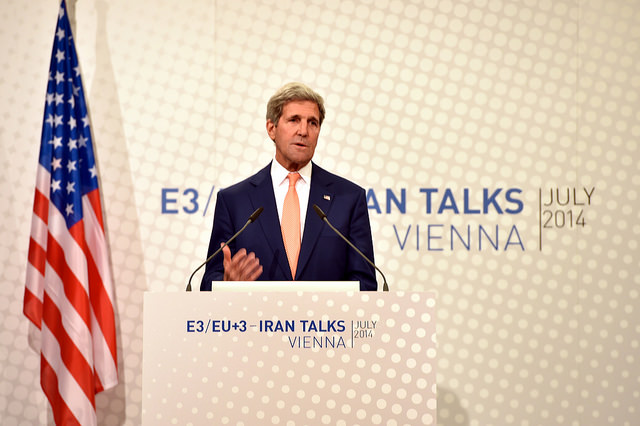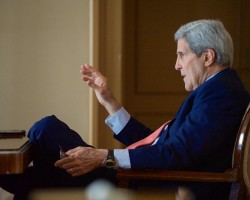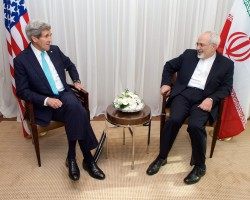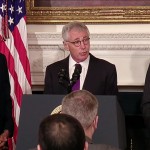
Iran Extension Is a Good Deal – Don’t Stop Now
Iran Extension Is a Good Deal – Don’t Stop Now
Congressional hawks are readying new sanctions against Iran despite last week’s extension of the negotiations between Tehran and the P5+1 nations to resolve the issue of Iran’s nuclear program. The extension of the interim agreement, the Joint Plan of Action (JPOA), imposes further restrictions on Iran’s program: In addition to halting all nuclear enrichment, Iran will freeze its development of new centrifuges and further reduce its stockpile of enriched uranium, extending its potential breakout time. Iran must also allow more frequent and intrusive inspections of its nuclear facilities. The extension has many vocal supporters in Congress who recognize the benefit of rolling back Iran’s nuclear program and preserving the potential for a peaceful, negotiated agreement. Despite this, conservatives are rallying in support of new sanctions that negotiators warn would derail the talks and lose the progress made towards preventing an Iranian nuclear weapon.
The terms of the extension obligate Iran to allow more inspections and further curtail its nuclear program. The new extension agreement further rolls back Iran’s nuclear program and stockpiles of enriched uranium, and enforces this progress with an expanded verification regime. The deal carries forward the freeze on Iran’s nuclear program from the JPOA and commits Iran to completely halt all uranium enrichment. Iran has also agreed to limit its research and development of more advanced centrifuges. Additionally, the new terms demand that Iran further reduce its stockpile of enriched uranium. Over the past year, Iran has diluted half of its stockpile of 20%-enriched uranium and converted the rest to oxide, a less usable form. Under both the first extension of the JPOA in July and this one, Iran now must convert much of the oxide into fuel for the Tehran Research Reactor. As Secretary of State John Kerry has noted, “Once the 20 percent material is in fuel form, it will be very difficult for Iran to use this material for a weapon in a breakout scenario. Attempting to do so would be readily detected by the [International Atomic Energy Agency (IAEA)] and would be an unambiguous sign of an intent to produce a weapon.” The extension will also entail new inspections of Iranian nuclear facilities, “doubl[ing] the frequency of its visits to the sites where Iran makes its centrifuges,” including “‘snap inspections,’ i.e., at times of [the IAEA’s] choosing,” reports Laura Rozen for Al Monitor. The new inspections regime is so thorough and extensive that the IAEA is requesting additional contributions from member states to finance the growth of its monitoring and verification program in Iran. [John Kerry, 7/18/14. Laura Rozen via Al Monitor, 12/1/14]
The diplomatic initiative with Iran has strong and vocal support in Congress. Many progressives in Congress came out in strong support of the extension. Sen. Carl Levin (D-MI) said that he supported the continuation of talks and that “the interim agreement reached a year ago has been a net plus as it has maintained the tough sanctions regime, limited Iran’s uranium enrichment and provided inspectors with expanded access to Iran’s nuclear facilities. The extension keeps that interim agreement in place while negotiations continue.” Rep. Debbie Wasserman Schultz (D-FL) praised the extension, saying, “To put it simply, our national security interests and that of our allies are better served with this interim agreement.” Sen. Dianne Feinstein (D-CA) wrote, “I urge my colleagues in Washington to be patient, carefully evaluate the progress achieved thus far and provide U.S. negotiators the time and space they need to succeed. A collapse of the talks is counter to U.S. interests and would further destabilize an already-volatile region.” Sen. Rand Paul (R-KY) has also voiced his support for the continuation of negotiations. [Carl Levin, 11/24/14. Debbie Wasserman Schultz, 11/25/14. Dianne Feinstein, 11/24/14]
Congress risks losing the progress made in rolling back Iran’s nuclear program and the chance of a diplomatic solution if it pursues new sanctions legislation. As hawkish conservatives prepare legislation that would place new sanctions on Iran, National Security Advisor Susan Rice warned this weekend that such a bill would “blow up” the negotiations. “The P5+1 would fracture, the international community would blame the United States rather than Iran for the collapse of the negotiations, and the Iranians would conclude that there’s little point in pursuing this process at the negotiating table,” Rice said. Should that happen, Iran would no longer be bound by the extended JPOA and could expel IAEA inspectors and restart its nuclear program – a path that would almost certainly lead to a military confrontation. Rice’s assessment was echoed by Sen. Rand Paul (R-KY), who said that “it would be a mistake to push them away from the table.” He criticized his conservative colleagues for pushing new sanctions. “There’s a certain bit of irony for the group that believes in virtually unlimited power for the president to conduct war, but they want to circumscribe the president’s ability to conduct diplomacy,” said Paul. [Susan Rice via the Hill, 12/2/14. Rand Paul via Wall Street Journal, 12/2/14 and Politico, 12/2/14]
Photo Credit: Secretary Kerry addresses reporters following nuclear program negotiations with Iran in Vienna. State Department Flickr, 11/24/14.





